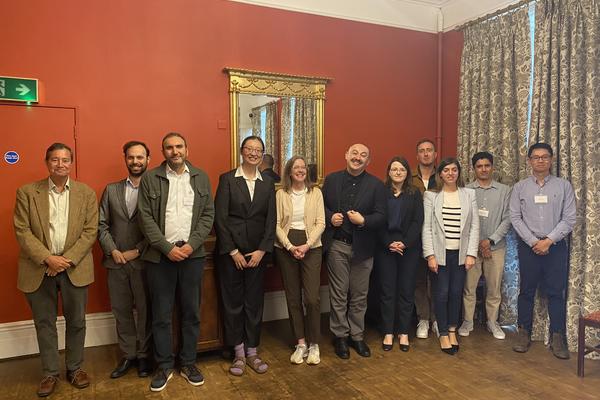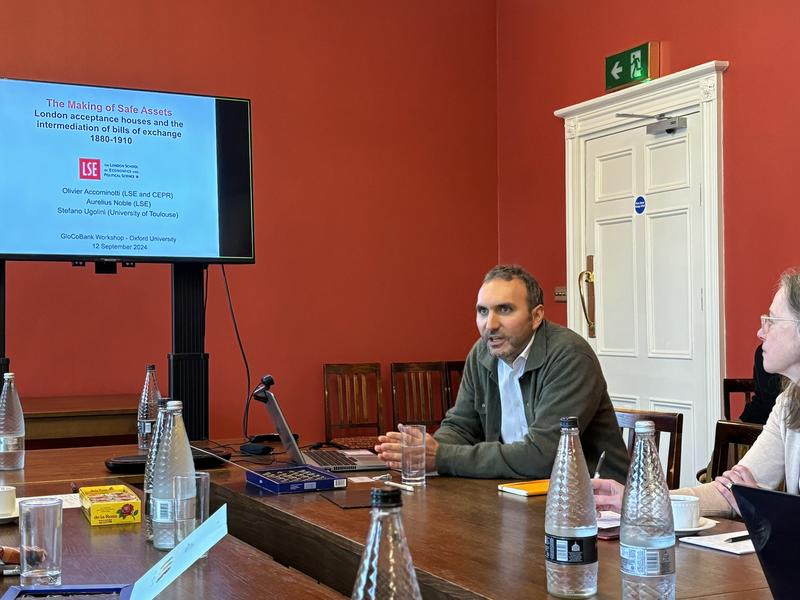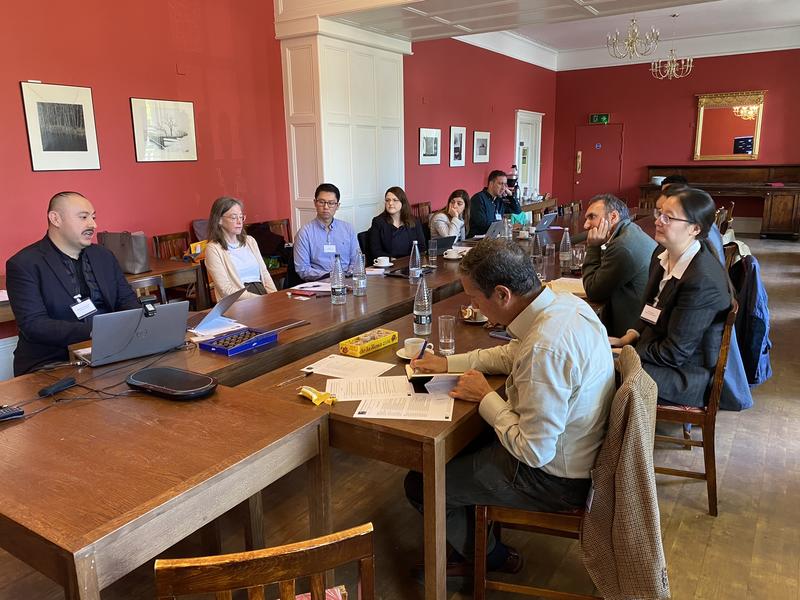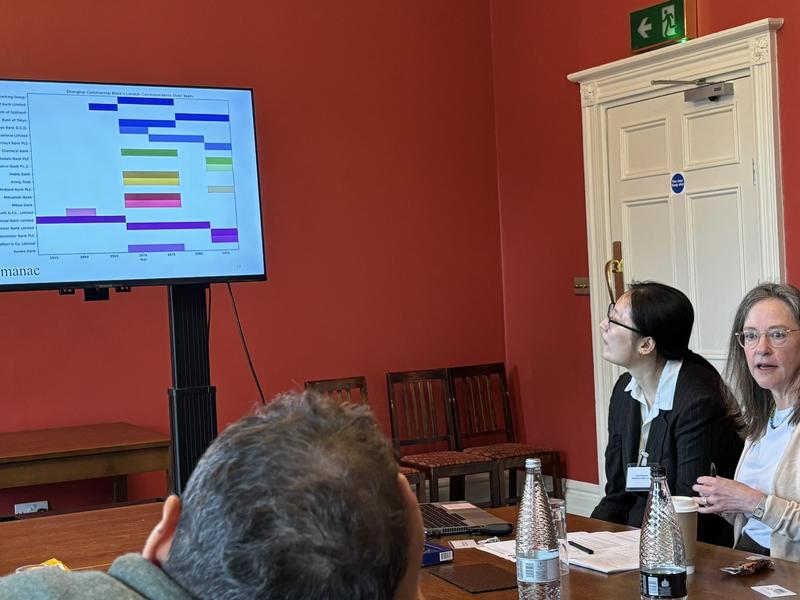Report: GloCoBank Annual Workshop (12 Sept 2024)

Workshop group l-r: Robert N. McCauley, Giovanni Pala, Olivier Accominotti, Nora Yitong Qiu, Catherine Schenk, Manuel Bautista-Gonzalez, Sabine Schneider, Jamieson Myles, Marianna Astore, Uziel Gonzalez, Robert Yee
The GloCoBank project held its fourth annual project workshop on Thursday 12th September 2024 in Oxford (and online), the latest in the series of annual workshops which provide an opportunity for GloCoBank researchers to share and discuss their latest research with our research network, academic advisory panel and invited guests.
On this occasion we were pleased to welcome a guest speaker, Professor Olivier Accominotti (London School of Economics) who presented his research (with Aurelius Noble, LSE, and Stefano Ugolini, University of Toulouse) based on the archival records of two leading merchant banks, Kleinworts and Barings, which explored how London acceptance houses intermediated credit for money market borrowers in 1880-1914. These methods resulted in the private production of a global safe asset: the sterling bank bill. The topic was of particular interest to the GloCoBank team and generated much discussion on payment systems and the intersect of correspondent banking.
The first GloCoBank paper was presented by Giovanni Pala and Catherine Schenk whose research paper establishes the importance of correspondent banking as an element of bank internationalisation strategy by examining one of London’s most prominent global clearing banks, Midland Bank. From the turn of the 20th century Midland Bank chose to focus its strategy on building a vibrant correspondent banking network to maximise international commercial business and earn fees and other income. Drawing on archival and quantitative evidence, it is possible to trace the geographic distribution of Midland’s international network of bank contacts and the way that this business fit with the bank’s wider global strategy. This case shows that, although exchange control restrictions and technological innovation changed the business model for correspondent banking, these bilateral bank-level relationships remained a key feature of bank internationalisation and sustained the global payments system through the 20th century.
This was followed by a paper co-authored by Nora Yitong Qiu and Catherine Schenk exploring the intricate dynamics of cross-border payments and financial integration in East and Southeast Asia from 1949 to 1965, focusing on the role of Shanghai Commercial Bank in Hong Kong. During this period, the geopolitical landscape was marked by significant events such as the Indonesian confrontation, the Malayan Emergencies, the Korean War, and the US occupation of Japan. The study offers valuable insights into the resilience and adaptability of financial institutions under geopolitical pressures, with implications for understanding contemporary financial sanctions and their effects on global economic systems.
We then heard from Manuel Bautista-Gonzalez who shared his recent experiences of conducting archival research in Brazil, Argentina and Chile. As well as describing some of the challenges and limitations faced during the trip, the presentation discussed some of the exciting archival sources that were uncovered during the trip and potential routes of enquiry, including plans for a joint paper with Marianna Astore on the Banco de la Rio Plata Argentina and migrant remittances.
Our final paper was by Jamieson Myles whose research evaluates the advantages of integrating credit into historical analyses of the interbank networks and how they underpin global payments infrastructure. The paper draws on the secondary literature and the archives of European commercial and merchant banks and seeks to link the micro-level practice of correspondent banking to macro-level processes. The long-term development of cross-border cashless payments and the emergence of national interbank networks illustrate the importance of credit in the payment system and highlight correspondent banks’ potential role in providing payment system elasticity on the global level.
We were fortunate to be joined by GloCoBank Associated Researcher, Robert N. McCauley, who gave responses and led the discussion for each of the papers.
Our thanks to all of our speakers, and to our research network members and guests who entered into the discussion with such enthusiasm and who continue to play such a valuable role in guiding and enriching the project’s research.






10:00 Giovanni Pala, Catherine Schenk (GloCoBank/University of Oxford)
The Global Correspondent: Midland Bank's Strategy and Network across the 20th Century
10:45 Discussion – Robert N. McCauley (Associate Member, History Faculty, University of Oxford/GloCoBank)
11:15 Manuel Bautista-Gonzalez, Giovanni Pala (GloCoBank/University of Oxford)
The Geography of Correspondent Banking Networks in Latin America from the Interwar Period to the Debt Crisis
Nora Yitong Qiu (UCL/GloCoBank Associated Researcher), Catherine Schenk (GloCoBank/University of Oxford)
Payments Across Financial Sanctions: The Case of Shanghai Commercial Bank in Hong Kong 1949-65
12:45 Discussion – Robert N. McCauley (Associate Member, History Faculty, University of Oxford/GloCoBank)
14:00 Olivier Accominotti, Aurelius Noble (London School of Economics), Stefano Ugolini (University of Toulouse)
The making of safe assets: London acceptance houses and the intermediation of bills of exchange, 1880-1914
Jamieson Myles (University of Geneva/GloCoBank Associated Researcher)
Elastic Infrastructure: Payments and Credit in Twentieth Century Global Correspondent Banking
15:30 Discussion – Robert N. McCauley (Associate Member, History Faculty, University of Oxford/GloCoBank)
16:00 Summary/future directions - Catherine Schenk (GloCoBank/University of Oxford)
18:30 Workshop dinner
Participants
In-person
|
Olivier Accominotti |
London School of Economics |
|
Marianna Astore |
University of Oxford/GloCoBank |
|
Manuel Bautista-Gonzalez |
University of Oxford/GloCoBank |
|
Uziel Gonzalez |
University of Oxford/GloCoBank Associated DPhil Researcher |
|
Robert N. McCauley |
Associate Member, University of Oxford History Faculty/GloCoBank Associated Researcher |
|
Jamieson Myles |
University of Geneva/GloCoBank Associated Researcher |
|
Giovanni Pala |
University of Oxford/GloCoBank |
|
Claire Phillips |
University of Oxford/GloCoBank |
|
Nora Yitong Qiu |
University College London/GloCoBank Associated Researcher |
|
Catherine Schenk |
University of Oxford/GloCoBank |
|
Sabine Schneider |
London School of Economics/GloCoBank Associated Researcher |
|
Robert Yee |
University of Oxford/GloCoBank Associated Researcher |
Online
| Marius Hafke | University of Oxford/GloCoBank Associated MPhil Researcher |
|
Wilfried Kisling |
Vienna University of Economics/GloCoBank Associated Researcher |
|
Simon Mollan |
University of York/GloCoBank Academic Advisory Panel |
|
Kirsty Peacock |
University of Oxford/GloCoBank Associated DPhil Researcher |
|
John Singleton |
Sheffield Hallam University (Emeritus)/GloCoBank Associated Researcher |
|
Xiaoyun Tang |
Kings College London |
|
Sean Vanatta |
University of Glasgow/GloCoBank Associated Researcher |
|
Zhang Wen |
Shandong University, China/GloCoBank Associated Researcher |



